We’re going to explain what search engines are and how they work. You already know what a search engine is. If you’ve ever used Google, Bing, or Yahoo, then you’ve used a search engine to look something up. These are simply software applications that help you access the world wide web. Obviously Google is the most famous out of the bunch as its widely used around the world and sets the standard.
Watch our Video on How Search Engines Works
In this video, we’ll discuss how Google discovers the content of each website using crawling and indexing. Lastly, we’ll discuss how Google displays different results based on the type of search being performed.
Understanding how search engines work is essential for making improvements to your site so that you can be displayed in search results. It’s also important for understanding how to capture searches being made for a product that you’re selling.
Search Engines in a Nutshell
In a nutshell, search engines help us search and retrieve information. But how? This is what we are going to dive into a little deeper. We’re going to explore how search engines handle our searches. Secondly, we’re going to explain how Google decides what information to present us with. Lastly, we’re going to explain how your interaction with search results actually has an effect on the type of search results you see.
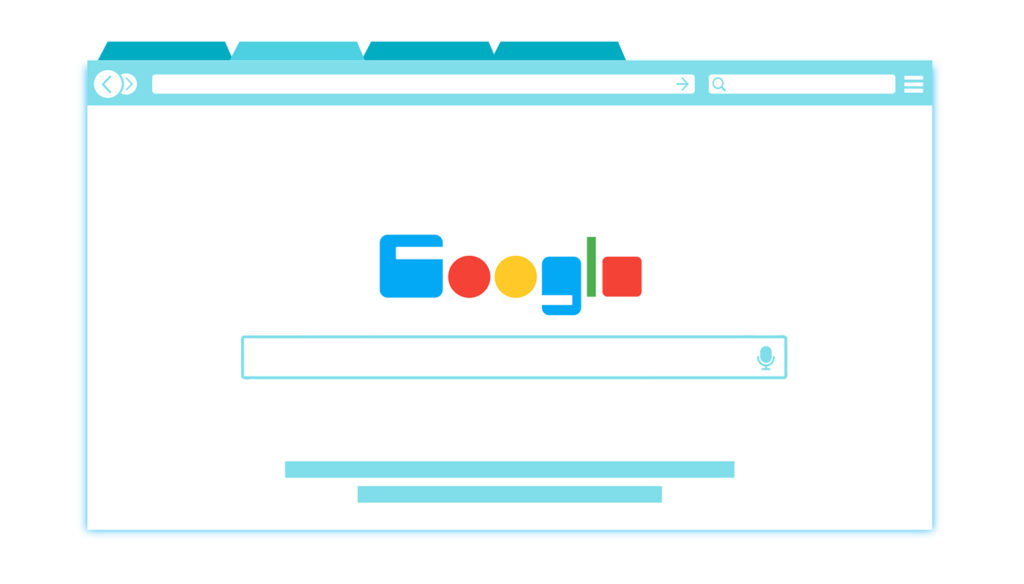
Google’s uses a sophisticated algorithm to figure out what you’re trying to search
The World Wide Web is Like a Soccer Team
If you had to pick out a soccer team, you would want only the best players on your team. The same is true for search results. Google wants to present you with the ‘best players’ for that specific topic. These top level players are going to have two things in common: relevancy and authority.
Although everyone wants to get picked for the final team, not everyone will. The coach is going to determine which players are the most effective at what they do. If they have never played soccer or don’t attend practice, their skills aren’t relevant. On the other hand, if they attend every soccer practice meet up, they are relevant. If other players can vouch for their expertise, then they hold a lot of authority.
Similar to creating a soccer team, every website is saying “Pick me!” Google’s first task is to eliminate irrelevant websites from search results in order to show you the most relevant information from reliable sources. Reliable websites are experts at what they do. Google then has to decide on a final pecking order of who will be chosen to display on the search engine results page (SERP), and and in what order.

When you search for something, Google always seems to get it right
We Ask Google Questions
When we type something into the search bar we are asking Google “Can you tell me more about this?” When we perform a search, we are requesting Google to supply us with relevant information on that topic. Whether it’s locating a nearby ATM or finding suggestions for places to eat, we are constantly asking Google questions. Furthermore, we have developed high expectations. We expect that the search results we’ll be presented with will serve as an answer to our question. This puts a lot of pressure on Google to ‘get it right’ the first time. Since we place such a strong belief in their abilities, they are constantly striving to meet those high expectations.
Google Gives Us Information
No matter what we search for, Google always seems to know the answer. Typically, the first page of search results will satisfy our thirst for information. If we enter a search query such as “buy sunglasses online,” we’ll most likely be shown ten different online stores that sell sunglasses. How does Google know exactly what we’re interested in? This is the big question. In order to understand how Google displays information, we first need to understand how Google sorts through information.
This, my friends, has everything to do with crawling and indexing.
Crawling And Indexing
The first thing Google does to any site is crawl and index it. What does this mean? Basically Google has robots that are called “crawlers” that will visit your site and take note of everything that it contains. Another name for these robots is “spiders.” Spiders crawl through the web trying to make sense of what they come across.
After crawling through your website, these robots will then archive or save the information they have found to a database. This process is sort of like how a librarian stores information about each book in a library catalog. Each piece of paper contains information about the book, what it’s about, and where it can be found.
As you can imagine, there is a lot of information for Google to crawl on the internet. There are billions of webpages to crawl and index, so this is no doubt an enormous task! By crawling and indexing your site, Google tries to understand what your site is all about. The basic question Google asks is, “What type of information does your website have?” For example, does your site sell cupcakes, motorcycle parts, or dog clothing? The content on your site will help Google figure this out.
Google will look at every single page on your site in order to get a better idea of what it is you do. For Shopify stores, Google will look at: your homepage, each individual product page, your blog, about us page, and your HTML sitemap if you have one. Furthermore, search engines will also look at the code on your site that is not readable to humans such as structured data.
The success rate of Google understanding what your site is all about really depends on the quality of the content on your site. A Shopify store with poor quality content is not going to tell Google much. On the other hand, a site with lots of quality content places itself in a good position for being featured on the front page. A Shopify store that has full product descriptions, a robust landing page, an HTML sitemap, and an active blog gives Google a lot of information to work with.
Different Types of Searches
Google handles millions of different types of search requests on a daily basis. Every second, their servers are grinding to push out the most accurate information in a fraction of a second to your fingertips. Google essentially matches a query (a word or phrase that is typed into the search bar) with a result. Naturally, they prefer when people keep it simple and use common language. We’re going to go over the various types of searches customers can perform as well as the many types of results they might see.
Specific Search
Specific searches are straight to the point. They use descriptive words to get at exactly what they are trying to find out. People often use specific searches when shopping for a service or product online. Essentially people are trying to find out more information before they make a purchase. Let’s suppose I search for “best wooden sunglasses.” Google will collect the top performing websites that sell or write about wooden sunglasses and present those to me as search results.
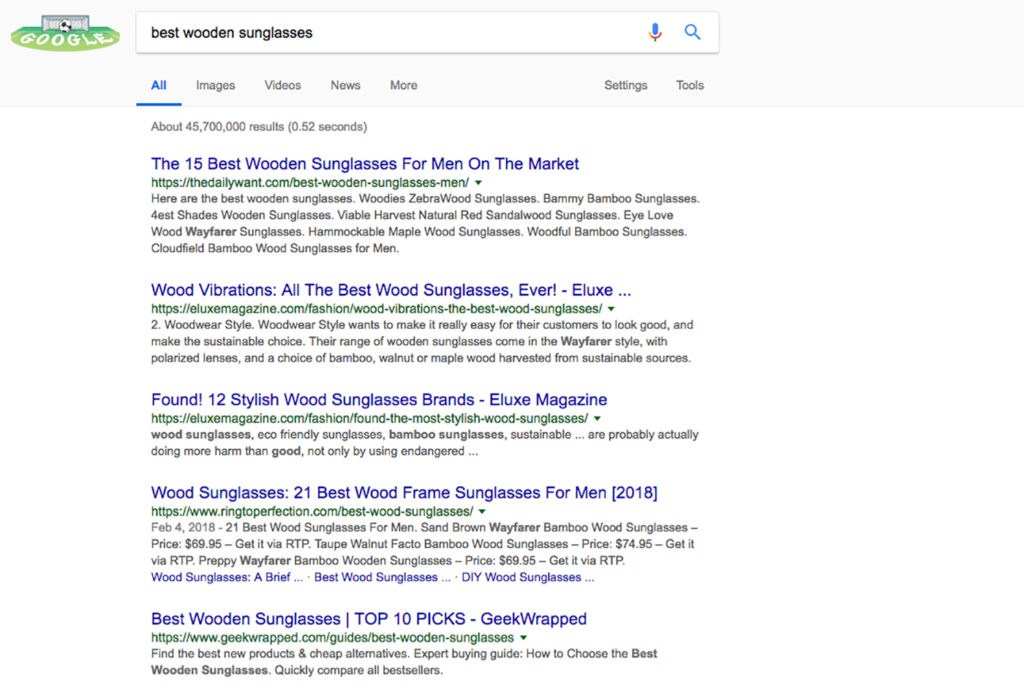
If I search for sunglasses online, I’ll get a range of results that Google thinks I might be interested in
Let’s suppose that I’m trying to buy wooden sunglasses from a specific company I heard about from a friend. If I search for “Woodies sunglasses,” Google will try to figure out which website I’m trying to find. They’ll successfully display Woodie’s website as the number one search result. Hence, Google has successfully matched my search query with an answer. By the way, Woodie’s is an online store that is 100% powered by Shopify.
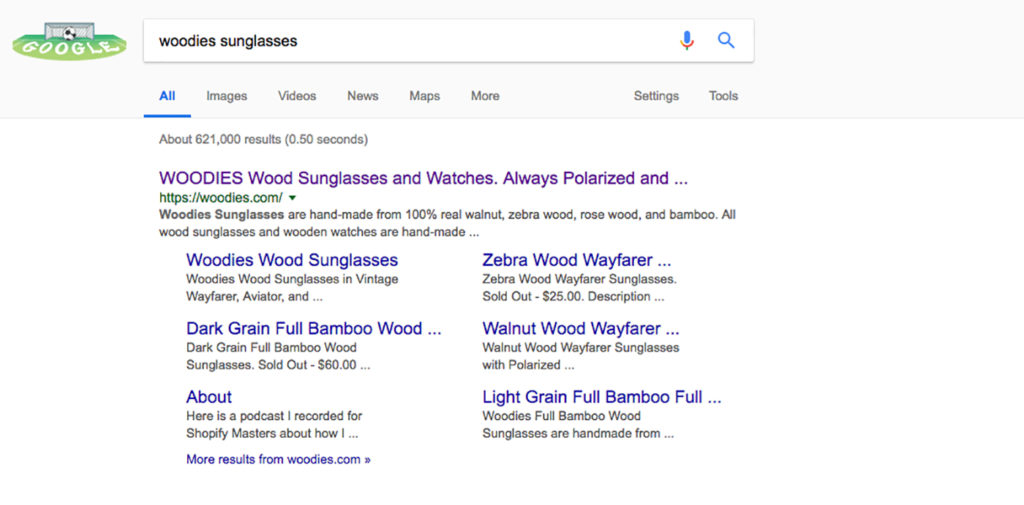
Notice how Woodies ranks as #1 for their company name, this means they have great SEO
? PRO TIP:When creating content for your Shopify store, think about the specific types of searches your customers might be making related to your products. Are they searching by your company name? Or are they searching for a product you might sell? You’ll want to target these specific keywords in your product descriptions, h1 tags, and blog articles. And most importantly, you’ll want to rank #1 for the name of your company.
Local Search
When someone searches for a local business in their area, this is called a “local search.” It basically means that the person performing the search wants to find a product or service in their city. They aren’t trying to buy something online, they want the service or product right now.
How does local search work? Let’s suppose we typed “Coffeeshop near me” into Google. Google will display a map along with a list of places it thinks you might like. Since I don’t know the name of the place I want to go to, Google will recommend places for me to check out.
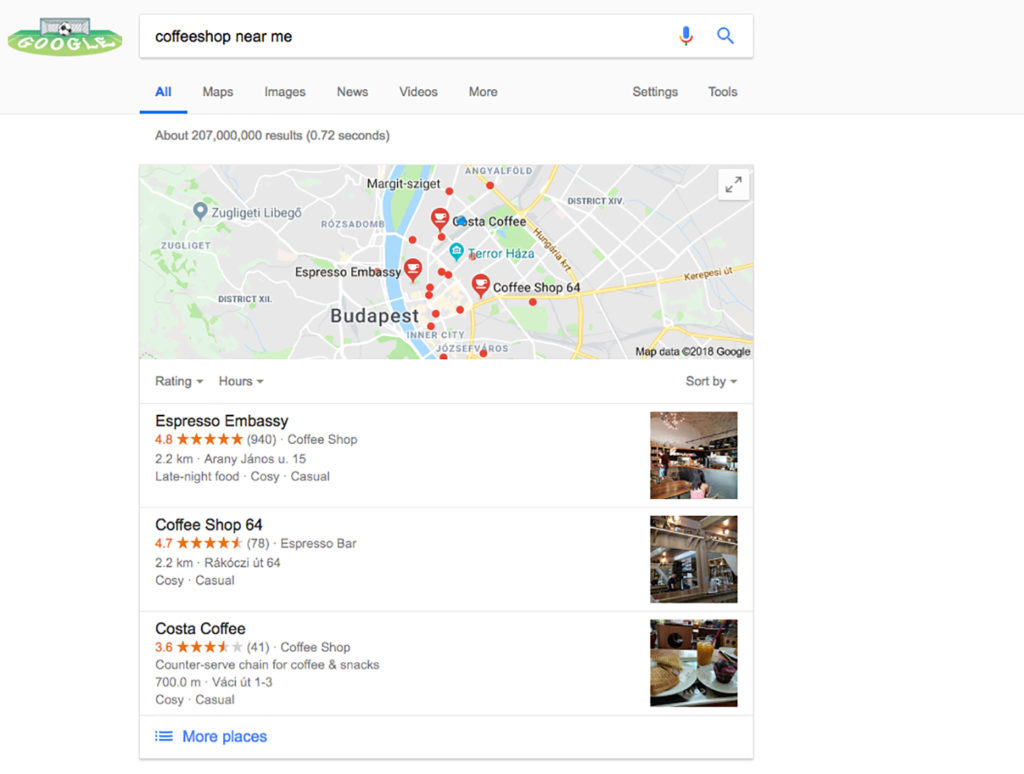
Google knows when you’re trying to locate a business nearby
If the person types in the exact name of a physical business, Google can potentially pull up more information about that particular place. Let’s suppose I typed in “Portfolio Coffeeshop Long Beach CA” into the search bar. Google will display this coffeeshop to me along with a knowledge card on the righthand side.
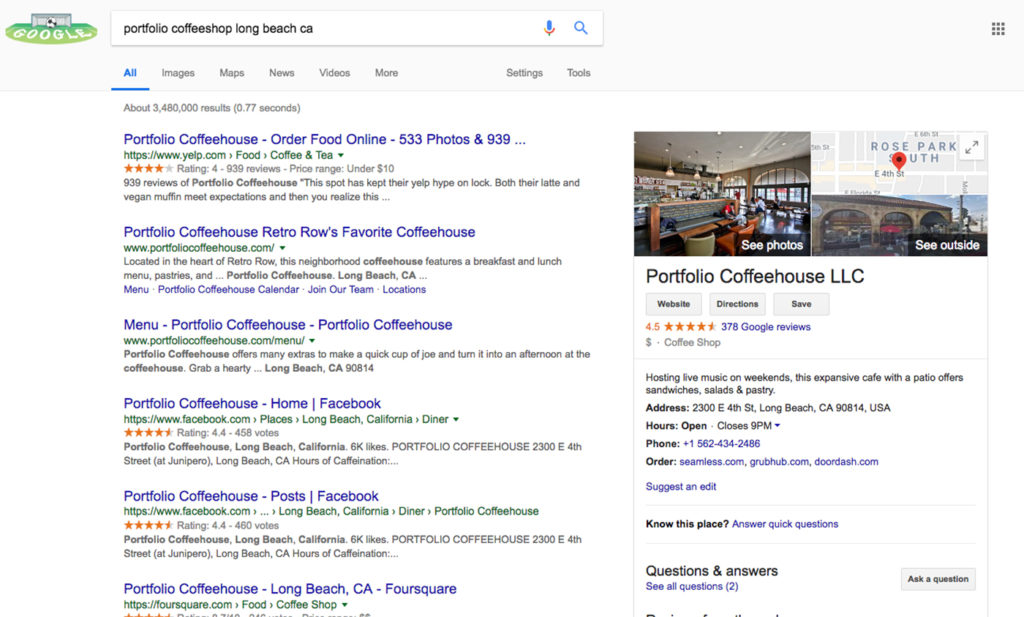
If I Google a place, Google will give me lots of extra information about this spot
? PRO TIP:If your Shopify store also has a physical location, appearing on local searches can help potential customers find your business! This is a huge opportunity for small businesses that depend on foot traffic. Check out our guide, Google My Business: 6 Benefits of Creating a Listing
How Folks Interact with Search Results
When people click on a search result listing, this has a direct effect on how the search process works.
One of the first indictors that Google looks at is whether or not a search result is getting clicked on. Website clicks show Google how interested people are in your webpage. When Google displays a site in search results, the ranking of that site depends on how well they perform. The real question is: Are people clicking on your website or not?
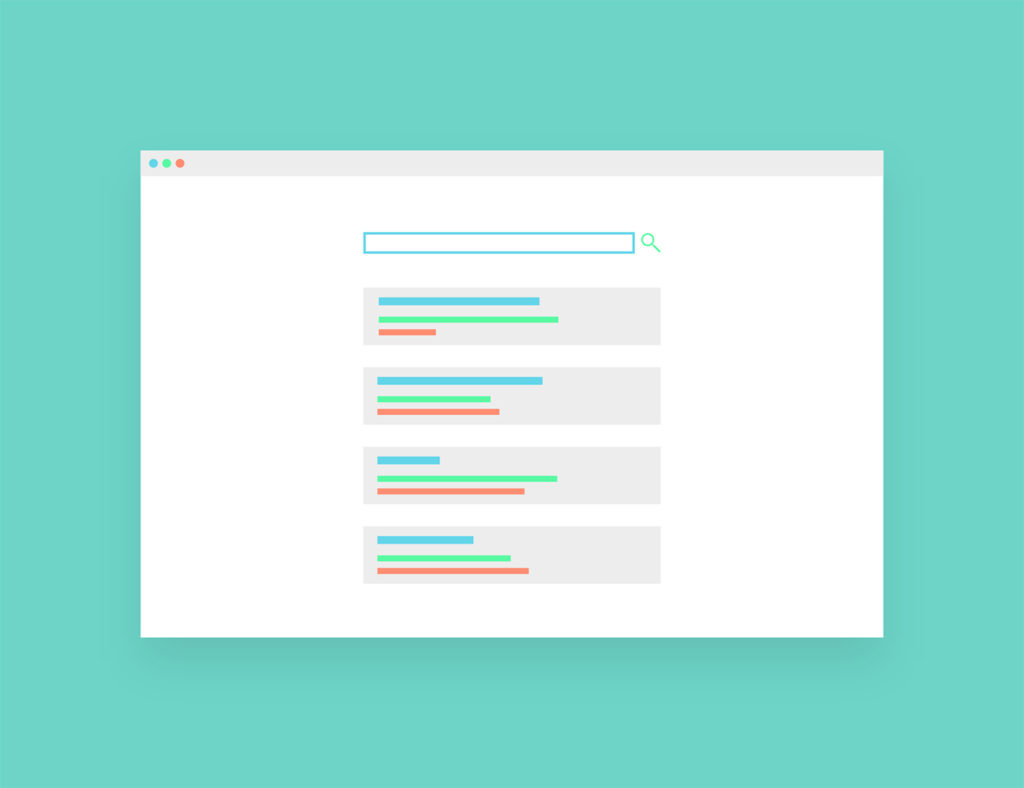
The way you interact with search results effects what you see on the page
The Art of Clicking
Where you click on the first page of results makes a big difference to Google. When you click on a website, it communicates to Google, “This is what I’m looking for!”
We are going to search for “best temporary tattoos” on Google.
Tattly is an online store that sells temporary tattoos and is powered by Shopify. They also happen to rank as number six on the first page of search results for “best temporary tattoos.”
Let’s suppose that Tattly is getting a lot of clicks to their website (after-all this has to be true since they are ranking on the first page of search results).
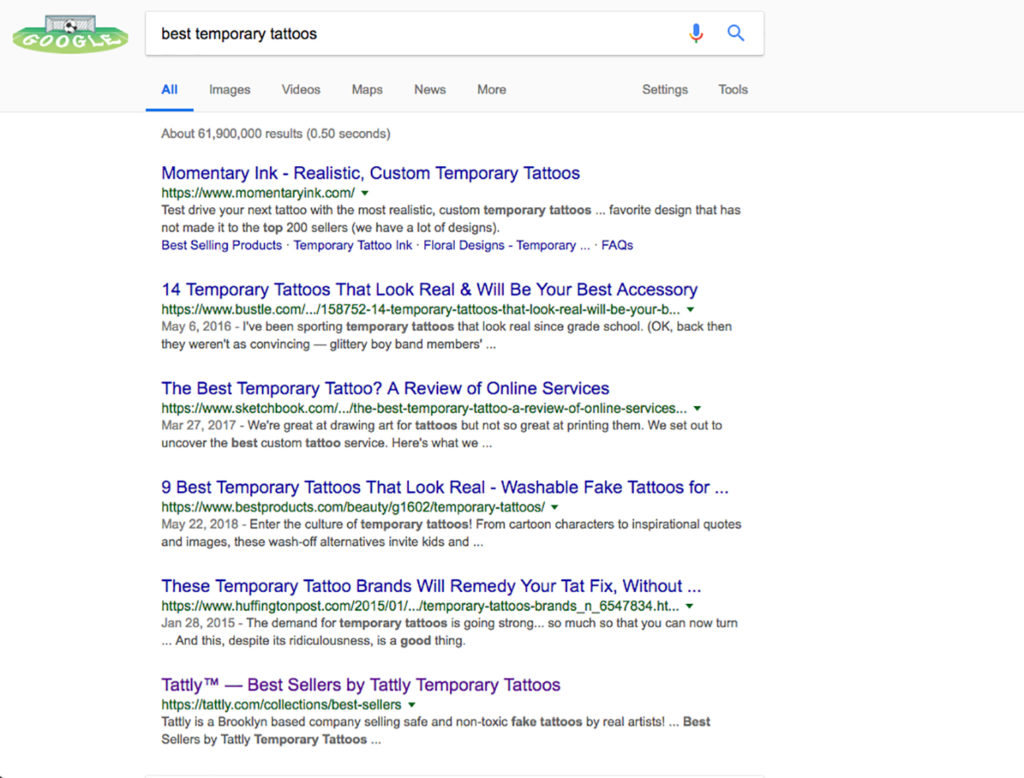
When you click on a website you are telling Google that website is the best out of the bunch
If a webpage that ranks lower is constantly being clicked, this tells Google that this webpage contains valuable information. It shows Google that something in your title or description made the person click on your website. Eventually, Google will notice that a website is continually being clicked on over and over again. Google can decide to bump up the site’s overall ranking.
In other words, if people continue to click on Tattly over all the other search results, eventually Tattly can become the #1 search result for the search terms “best temporary tattoos.” This too is true for your online business.
If you write engaging meta descriptions, have easy to read urls, and descriptive title tags, there’s a good chance you’ll get clicked on more often.
Content is King
Secondly, Google favors webpages that contain a lot of helpful text (not super short articles). If there is a lot of valuable information for people to read through, people tend to spend a longer time on the website. This is called a low bounce rate.
By having a low bounce rate, this tells Google that the person indeed found what they were looking for. In turn, Google will be more likely to display this webpage to others when searching for the same word or phrase. They’ll know that since other people considered this webpage helpful, it might also be helpful to you.
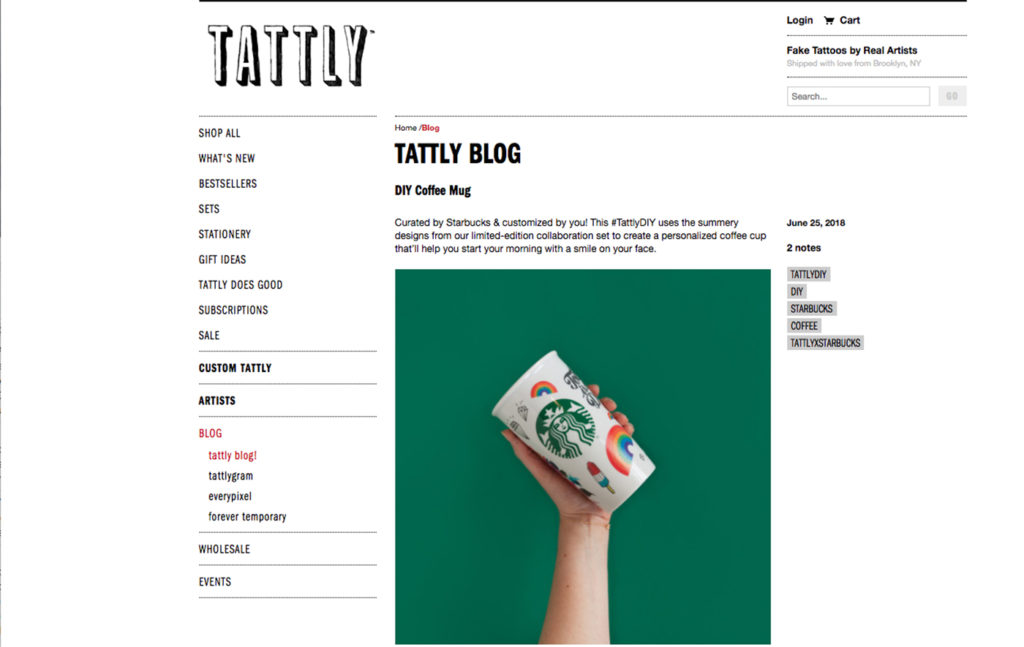
Tattly does a great job featuring their own products in enticing blog DIY tutorials
If you were to head over to the Tattly blog, you’ll notice that they have a lot of engaging content related to all things temporary tattoos. By encouraging the potential customer to circulate from one blog article to another, this helps to lower their overall bounce rate. Not to mention, it does wonders for sales by featuring new and noteworthy products in each article.
? Did You Know Shopify SEO is a 3 Part Series?
✅ Part 2: How Ranking on Google Works
?? Part 3: Tracking Your Progress
Shopify Success Newsletter
Don't miss out on the best tips and guides for Shopify sellers!
